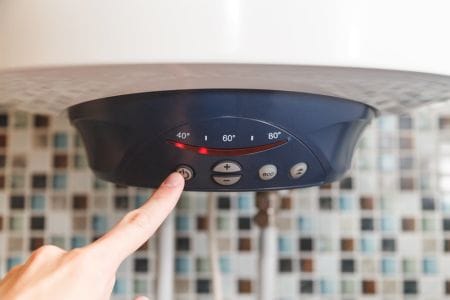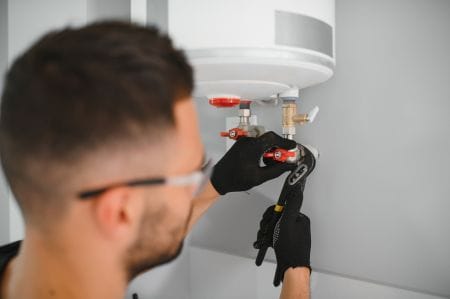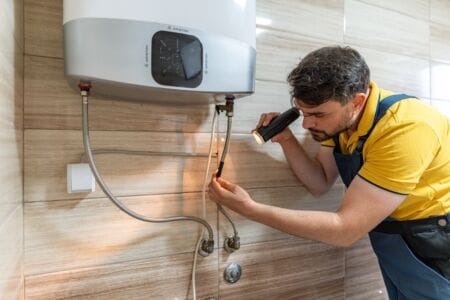Contents
ToggleWhat we'll cover...
All sorts of products and measures that can be used to enhance the energy efficiency of your home heating.
Why energy efficiency is more important than ever
Heating your home efficiently isn’t just about keeping warm – it’s about saving money, reducing your carbon footprint, and making your home a more comfortable and sustainable place to live. Whether you’re looking to slash your energy bills, reduce your reliance on fossil fuels, or simply ensure your home stays cosy without cranking up the thermostat, energy efficient heating is the way forward.
But let’s be honest – heating systems can be confusing. Do you need a heat pump? Should you upgrade your radiators? What on earth is a BTU rating, and why does it matter? If you’ve ever found yourself Googling “Why is my energy bill so high?” while wearing three layers of thermals, this guide is for you.
We’re going to cover everything you need to know about making your home heating as energy efficient as possible. From choosing the right system to optimising your insulation and using your heating at the ideal time, we’ll walk you through the best ways to stay warm without wasting energy – or money.

Why energy efficiency matters: Saving money and reducing carbon footprint
Energy-efficient heating isn’t just good for the planet; it’s great for your wallet, too. Here’s why it should be a top priority for every homeowner:
Lower energy bills
According to the Energy Saving Trust, heating accounts for around 60% of the average UK household’s energy consumption, which means inefficient heating is costing you a fortune. A well-optimised system could cut your heating costs by up to 30% – that’s extra cash for the truly important things in life, like takeaway pizza and fancy coffee.
Reduced carbon footprint
The less energy you use, the fewer carbon emissions you produce. In an era where sustainability is more than just a buzzword, upgrading to an energy-efficient heating system is a meaningful way to do your part for the environment.
Consistent home comfort
A well-designed heating system provides consistent, even warmth. No more roasting in one room while another feels like the Arctic tundra. With smart heating solutions paired with smart radiator valves and efficient insulation, you can maintain an ideal temperature throughout your home.
How to choose the right heating system for your home
With so many options available, finding the right heating system can feel overwhelming. Here’s a breakdown of the most energy-efficient choices:
Heat pumps: The future of home heating?
Heat pumps are one of the most energy-efficient heating solutions available today. They work by extracting heat from the air, ground, or water and using it to warm your home. The best part? They use far less electricity than traditional heating systems, making them an environmentally friendly option.
Pros:
- Extremely energy-efficient, often achieving over 300% efficiency (meaning they produce more heat than the energy they consume)
- Lower running costs than gas boilers
- Reduce carbon emissions significantly
Cons:
- Higher upfront cost
- Require outdoor space for installation
- Less efficient in extremely cold climates
We have other articles discussing the merits of heat pumps in our Advice Centre too. Take a look at our Ultimate guide to air source heat pumps, and our resource on Busting the myths about air source heat pumps for further detail.
High-efficiency gas boilers: A worthy upgrade
If you’re not ready to make the leap to a heat pump, upgrading to a modern condensing boiler is the next best thing. These boilers are designed to reuse excess heat that would normally be wasted, making them far more efficient than older models.
Pros:
- Up to 90% efficiency in operation
- More affordable upfront cost compared to heat pumps
- Compatible with existing radiator systems
Cons:
- Still reliant on fossil fuels
- Not as efficient as renewable heating solutions
Further insight can be found in the BestHeating guide to buying a new boiler.
Electric radiators and infrared panels
Electric heating has had a bit of a reputation for being expensive, but modern electric radiators and infrared panel heaters are a different story. Infrared panels heat objects rather than the air, which means less heat loss and a more comfortable, evenly heated home.
Pros:
- Instant heat with zero wasted energy
- No need for pipework or gas connections
- Can be powered by renewable electricity for a greener home
Cons:
- Higher running costs if using non-renewable electricity
- Infrared heating can feel different from traditional radiators
Understanding BTU ratings and choosing the right radiator output
If you’ve ever heard the term BTU (British Thermal Unit) and immediately switched off, don’t worry – we’ve got you covered. Simply put, BTU ratings tell you how much heat a radiator can produce. Choosing the right output is essential for energy efficiency; too low, and your room will feel like a fridge. Too high, and you’ll be wasting energy (and money) unnecessarily.
How to calculate the right BTU for your room
Use an online BTU calculator to determine your exact heating needs, based on:
- Room size
- Insulation levels
- Window type and size
- Ceiling height
A well-chosen radiator with the correct BTU rating ensures that your home stays warm without overworking your heating system. There’s further information in our dedicated article, High BTU vs low energy use: Can you have both?
Smart heating controls: How automation can improve efficiency
A smart thermostat is like having a personal assistant for your heating system – it learns your schedule, optimises energy use, and ensures your home is always at the perfect temperature.
Why smart heating controls are a game changer
- Learning algorithms: Smart thermostats adapt to your routine, heating your home efficiently without unnecessary energy use.
- Remote control: Adjust your heating from your phone, whether you’re in bed or on a beach in Spain.
- Zoned heating: Control the temperature in different rooms separately, so you’re only heating the spaces you’re using.
If you’re not using smart controls yet, you could be wasting up to 25% more energy than necessary. It’s like leaving the lights on in a room you’re not using – except much more expensive.
The role of insulation and heat retention in home heating
Even the most energy-efficient heating system won’t help if all your warmth is escaping through poorly insulated walls and windows. Think of insulation as a cosy blanket for your home – without it, you’re just throwing money out of the window (literally).
Top insulation and draught-proofing tips
- Upgrade to double or triple glazing to minimise heat loss.
- Insulate your loft and walls for maximum heat retention.
- Use draught excluders to stop heat escaping through doors and windows.
- Consider thermal curtains to trap heat inside your home.
By improving insulation, you can reduce your heating demand and make huge savings on your energy bills.
Shop energy efficient heating solutions from BestHeating
Ready to upgrade your heating system? Whether you’re looking for a stylish new designer radiator to team with a high-performance heat pump, or require energy efficient radiator valves or smart heating controls to transform your setup, BestHeating has you covered.
Check out our full range of energy-efficient heating solutions and take the first step toward a warmer, greener, and more affordable home today! For more information, or any other queries, you can reach out to us via our social channels on Instagram, Facebook or X.
John is a Research Specialist for the Best Heating Advice Centre, where for over nine years he has dedicated himself to demystifying home heating for our customers. He specialises in creating clear, data-driven guides and how-to articles by collaborating directly with our team of certified heating experts and product engineers.
His work, built on a foundation of journalistic research, has helped millions of readers make confident and informed decisions about their home heating. When he’s not breaking down the heat output differentials from radiators to heated towel rails, John fancies himself as a fine football and music connoisseur.







